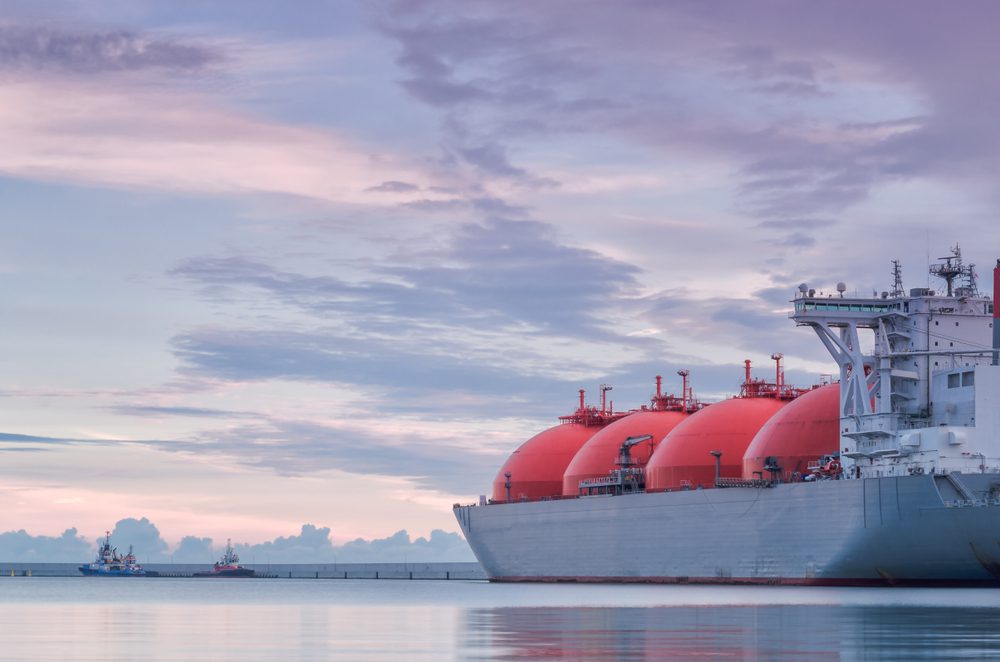Geopolitics, High Bids, and U.S. Pressure Cloud COSCO’s Global Port Ambitions
COSCO Shipping Ports is facing "challenges" with its international investments amid pressures from the U.S. trade war, its managing director said in Hong Kong on Thursday.

Wojciech Wrzesien / Shutterstock
By Dan Murtaugh, Stephen Stapczynski and Aibing Guo (Bloomberg) — Buy high, sell low and guarantee a loss. It’s not exactly what Toshiba Corp. planned when it dipped its toes in liquefied natural gas trading.
Yet that’s exactly how it turned out, as the Japanese industrial giant capped off its five-year misadventure in LNG Thursday by paying ENN Ecological Holdings Co. $806 million to take its interest in a U.S. export venture off its hands. The Chinese gas distributor gets the right to liquefy and sell 2.2 million tons a year at the Freeport LNG plant in Texas, in addition to the cash.
The deal marks Toshiba’s second exit from a troubled energy business this year, after it sold claims in its Westinghouse U.S. nuclear unit in January. Toshiba said in a statement that the LNG business was no longer a core focus and it wanted to exit to eliminate the risk from changing market conditions.
“Toshiba benefits by not having to deal with a business they never really felt comfortable with,” said Nicholas Browne, an analyst with Wood Mackenzie Ltd. in Singapore. “It’s one more item of housekeeping by Toshiba to clean house of long-term obligations and follows the writedown of the Westinghouse acquisition.”
Toshiba shares fell as much as 2.8 percent in Tokyo on Friday after surging 12 percent the previous day when the company announced the sale and reinstated dividends. ENN shares in Shanghai gained as much as 4.8 percent Friday.
When Toshiba struck the tolling agreement with Freeport in September 2013, the outlook for profit seemed bright. Gas sold in Asia, mostly linked to $100-a-barrel oil, was priced at a significant premium to U.S. gas made cheap by abundant supplies from shale fields.
Toshiba agreed to contracts that required it to pay for space in pipelines and the liquefaction plant regardless of whether or not it used them. Toshiba never disclosed its costs, but Wood Mackenzie estimated its fixed costs at about $360 million a year, or a $7.2 billion liability for the life of the 20-year contract.
That was fine back then when the profit margin was wide. But in 2014, global oil prices crashed, bringing down the cost of LNG contracts linked to it. For much of the past four years U.S. LNG, after adding in tolling and shipping costs, would have had to be sold at a loss in Asia.
The tolling agreement may also be hard for a tech-focused company without much experience in commodity trading like Toshiba to manage by itself. Toshiba would potentially need to source its own feed gas, figure out pipeline shipping logistics and even charter vessels for export. While the company said it recently signed binding sales agreements for LNG shipped from Freeport, it never announced the name of the buyers.
As well, falling costs for renewable power has slowed global demand for gas-powered turbines, hurting any plans Toshiba had of offering gas supply coupled with power generation equipment, according to Zhi Xin Chong, an analyst with IHS Markit in Singapore.
As a second wave of prospective U.S. exporters began offering lower costs for tolling fees, Toshiba would have been forced to grant extra incentives to make its deal look more favorable.
“Some new U.S. LNG projects are offering more competitive cost structures than were on offer during the first U.S. LNG wave, leaving some legacy U.S. LNG contracts out of the money,” said Saul Kavonic, an energy analyst with Credit Suisse Group AG.
Ironically, as Toshiba completed the deal, U.S. LNG is once again competitive in Asia, thanks to a rally in oil prices. Adding liquefaction, shipping and other costs to a December 2020-delivery U.S. natural gas futures contract, the price is almost identical to the same volume of gas in a typical Brent-linked cargo.
“U.S. LNG can be competitive against LNG oil-indexed contracts,” IHS’ Chong said. But “commodity arbitrage was a secondary consideration for Toshiba.”
© 2018 Bloomberg L.P

Sign up for gCaptain’s newsletter and never miss an update

Subscribe to gCaptain Daily and stay informed with the latest global maritime and offshore news


Stay informed with the latest maritime and offshore news, delivered daily straight to your inbox
Essential news coupled with the finest maritime content sourced from across the globe.
Sign Up